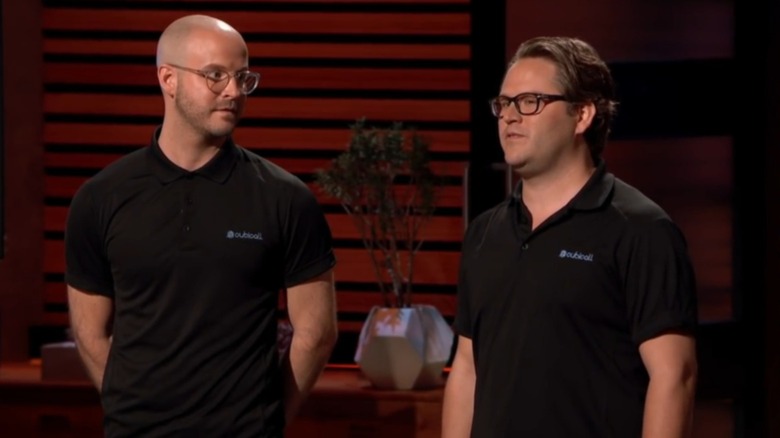Whatever Happened To Cubicall After Shark Tank?
For several years, COVID-19 caused a tremendous amount of upheaval regarding work. In the early stages of the pandemic, businesses had to quickly adapt to new standards and safety protocols to keep people healthy. According to Pew Research, about 20% of jobs operated with a work-from-home setup before the pandemic. That number jumped to 71% during the pandemic, with 54% of respondents saying they wanted to continue to work from home after the pandemic ended, due to issues like a better work-life balance and safety concerns over the still highly transmissible virus.
While the workplace culture has shifted again as the pandemic has receded into the past, with more companies insisting on either hybrid or full-time returns to the office, there have still been plenty of opportunities for investors, inventors, and those willing to take another look at how office space is used. That's where "Shark Tank" has come in, with its high-profile investors judging pitches from would-be innovators and hopeful business owners.
For every terrible idea, there is often an equally good one on the table that requires a deal and investment. One such company came up with the Cubicall, a self-contained modular construct perfect for isolation and privacy and resembling a modern take on phone booths. It appeared on Season 10 of "Shark Tank," before the pandemic, but is the company still in business?
Cubicall had to negotiate to get Shark Tank to bite
Named as a portmanteau of "cubicle" and "call," the Cubicall is a glass enclosure that sequesters those inside from the surrounding environment, perfect for people who are concerned about the spread of germs or need to get away from the sounds of a busy office. With its modular nature, the Cubicall is a solution for offices, homes, and even healthcare. They can be used as phone booths, as enclosed workspaces, for exams, for studying, for partitioning space, and even as isolation pods for healthcare — a versatile means of controlling indoor space.
Appearing in Episode 22 of Season 10, Cubicall company co-founders Nick and Anthony Pucci made their pitch to the investors of "Shark Tank." The Puccis originally asked for $350,000 for 10% of the company, which caused several of the "Shark Tank" investors to balk at the offer. However, Barbara Corcoran offered the $350,000 investment for 25% of the company, and the Puccis countered with a 15% equity stake. After some back and forth, Corcoran said she could only get excited about a 25% stake, and the Puccis relented and accepted her deal because no other offers were on the table.
With Corcoran's blessing and financial input, Cubicall hit the ground running, but how has the company fared since its appearance on the popular reality television show?
Cubicall suffered a pandemic downturn
The current starting price of the standard-issue Cubicall runs around $7,995, and it contains two built-in USB outlets, a 120-volt outlet, an energy-efficient LED light that turns on when somebody enters, and a fan for circulation. The company offers a great deal of customization that can greatly affect the overall cost.
During a 2017 interview with CEOCFO Magazine, Michael Pucci, father of Nick and Anthony and co-founder of Cubicall, was asked about the concept and vision of the company. "One of the challenges was taking phone calls with our clients," he replied. "We were near each other and are very opinionated. While on a phone you would hear sighs, laughs, and whispers of what you should have said. Thus, it became antagonistic more than anything working in an open environment." He continued, "We had to find a solution. We started looking at old phone booths to see if we could buy one. Nothing was available at a reasonable price — not to mention they were hideous."
Cubicall did see its profits fall during the initial outbreak of COVID-19, and the company moved its base of operations to Las Vegas. By June 2021, the company was generating around $1 million in annual revenue. But while it initially suffered somewhat of a downturn at the start of the pandemic (like most companies), the company still exists — and appears to be rebounding.
Cubicall has become a true success story
After suffering a setback due to the COVID-19 pandemic, which naturally decreased the need for office cubicles, Cubicall has begun to see a resurgence. The company adjusted for any shortfalls during the pandemic by putting its energy into its portable medical exam booths — definitely a necessity when the coronavirus was raging and perhaps just as useful even afterward.
It's now a busy, thriving business, turning things around by landing government contracts and partnering with tech companies like IBM and Cisco. Its products are in multiple hospitals, and has seen praise in such press outlets as Fox Business and the New York Times. The business has taken such a complete upturn that Cubicall has moved to a bigger manufacturing plant. The company even reported a profit of $2 million for 2022. It looks like the business managed to survive the pandemic and come back swinging.
It's hard to say how long the idea of portable meeting booths and examining rooms will remain popular. But as of this writing, Cubicall seems to have everything going its way — and customers are anything but divided on that.



